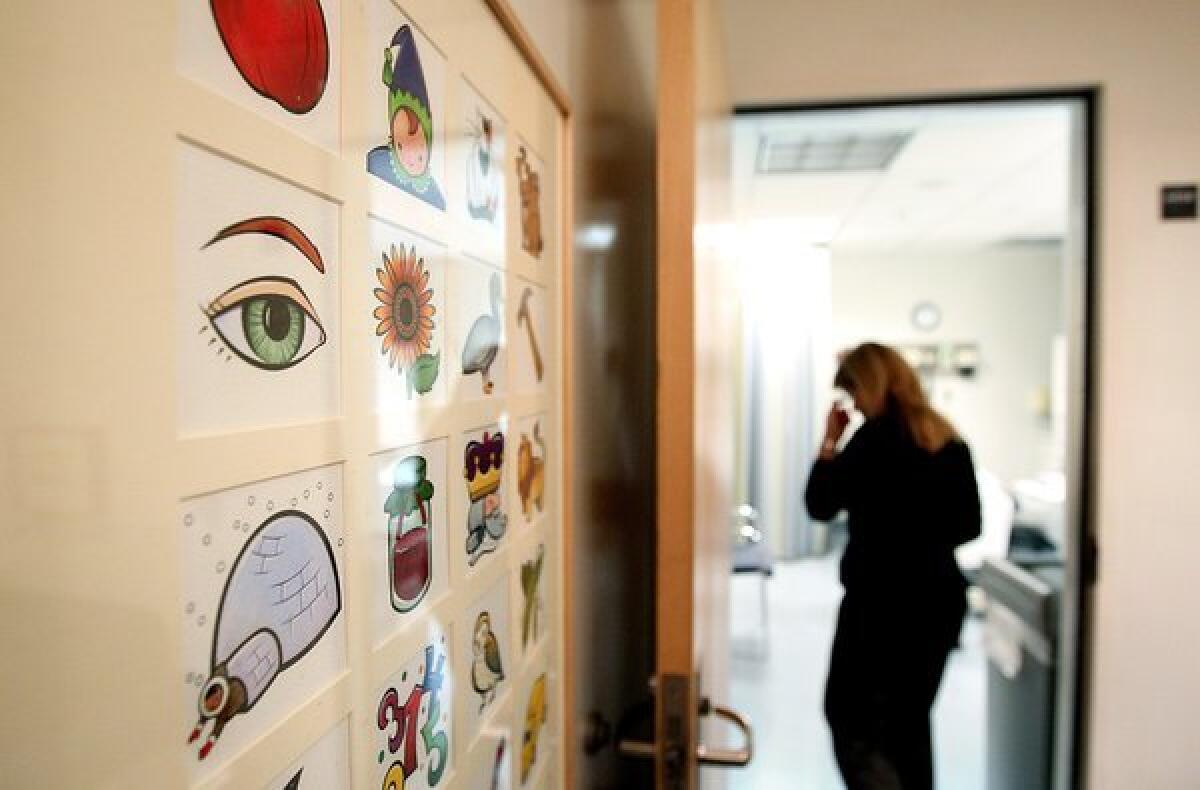Fighting cancer to see son grow up
Nina Polvanich Louie, who has Stage IV cancer, has a 1-in-20,000 chance of finding a blood marrow match. Her motivation to keep trying is 2-year-old Donny.
- Share via
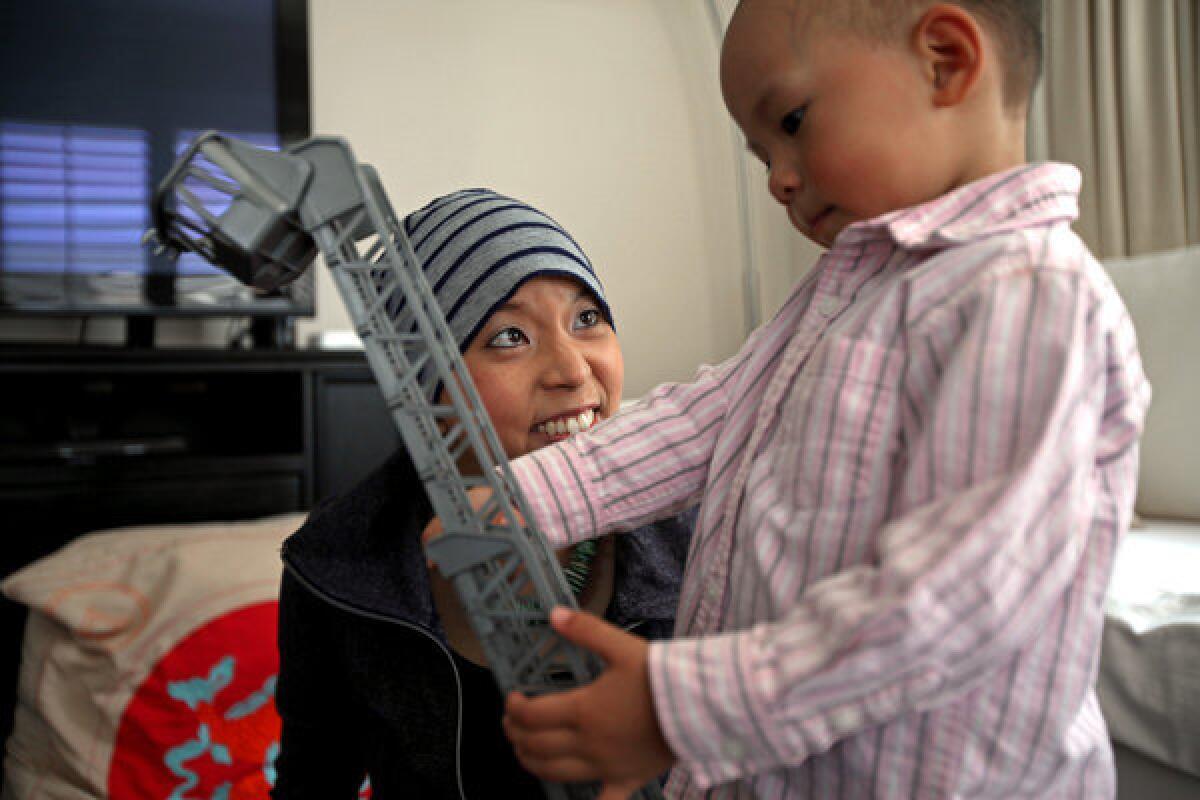
Her son said "Mommy" for the first time after Nina Polvanich Louie came home from chemotherapy.
Donny started preschool the morning Nina first met her oncologist. When she returned from another appointment, the 2-year-old looked her in the eye and said something he never had before: "I love you."
For a parent, every milestone a child passes is an achievement. For Nina, 32, each time Donny does something new is also a reminder of how little time she may have left with him.
Nina has an advanced stage of blood cancer and is hoping to find a bone marrow donor within a month. Doctors say she has about a 1-in-20,000 chance of finding a match.
The other day, Nina saw a young boy waiting with his father and mother in the hospital where she gets treatment. The child was playing a game, putting his hands on his father's and trying to pull them away before his dad could tap them. He laughed whenever his father playfully slapped his hands.
As she watched the family, Nina quietly started to cry.
"Donny can't do that yet," she said, "and I wondered if I would ever have a moment like that with him."

As the youngest child of Thai immigrants who settled in the Houston area, Nina wasn't around children much and was sometimes unsure of herself whenever she met a toddler.
"I was more of a dog person," she admitted.
After college, Nina went to Thailand to work for the business consulting group McKinsey & Co. for three years before returning to the United States to attend Harvard Business School, where she met her husband, Matt, during a mixer.
The two married in December 2008 and moved to West Hollywood, close to Matt's job at a financial services firm, while Nina began to run her family's import business from home. Both had to travel frequently for work, so they had only started to kick around the idea of having children when Matt went on a trip in January 2010.
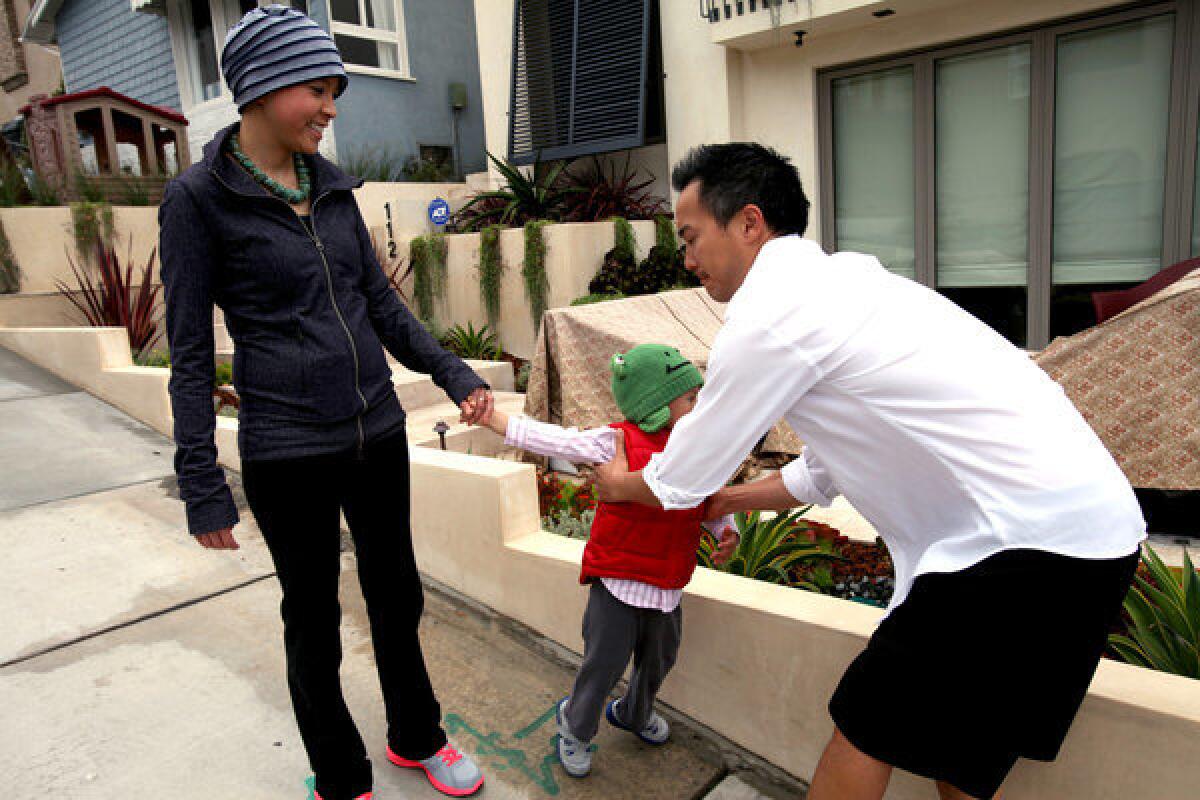
Nina's husband, Matt, picks up their son Donny during a walk outside their Manhattan Beach home. Although her son doesn't know the extent of Nina's illness, he can tell something is wrong, she said, and has become frightened around strangers. More photos
Soon after her husband left, Nina started to feel funny and, as a precaution, bought a pregnancy test from a nearby drugstore. When she saw two blue lines signaling a positive test result, Nina thought it had to be a mistake and went back to buy two different kits.
She got a "+" sign and then a happy face. "I couldn't believe it," she said.
Nina kept the news to herself for two days, then blurted it out when she picked her husband up from LAX. "Are you sure you're ready to start a family?" she asked Matt.
And Nina wasn't sure she was ready to be a mother. When she told her friend Roxanne Daniels that she was pregnant, Nina said, "Oh my God, I just wasn't expecting this to happen."
"I was a little worried" about the adjustment, Roxanne said.
When Nina's water broke at 4 a.m. in September 2010, she texted Roxanne, who immediately started driving to Los Angeles from her home near San Francisco. When she walked into Nina's room around 9 a.m., the new mother was holding her baby in bed.
"I'd never seen her smile like that for anyone," Roxanne said. "She was just lit up, like the best part of her was suddenly turned on."

For Donovan's first birthday, Nina organized a large party. She planned an even bigger celebration for his second, ordering a two-tiered red velvet cake, sending out invitations to 100 people and reserving space at a nearby park last September.
But a nagging pain in her lower back and leg wouldn't go away. She also couldn't seem to shake a cough and runny nose. When she went to a friend's wedding, she became short of breath after going onto the dance floor.
Her father-in-law, James Louie, a rheumatologist at UCLA, recommended she visit one of his colleagues, who ordered an X-ray.
"I just thought I had a cold or had pulled something carrying Donovan," Nina said. "I wasn't worried at all."
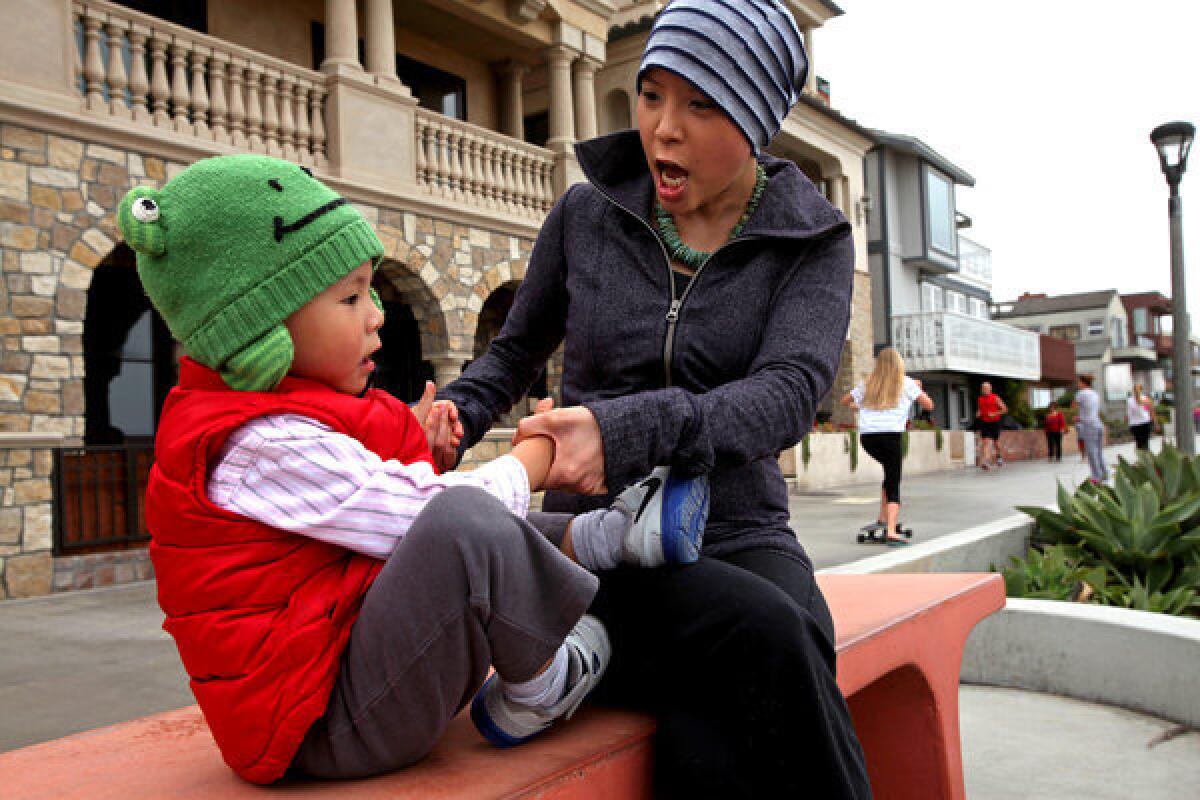
Nina's doctors say getting a match within two months would be the best-case scenario. While she's been dealing with her illness, she's also been trying to shield her 2-year-old son Donovan from finding out she's sick. More photos
When the results came back, James Louie's colleague showed him the images.
"My heart fell out," he said.
Nina remembers when she saw the X-ray for the first time. There was a thick white blotch around her heart.

Doctors diagnosed Nina with Stage IV diffuse large B-cell lymphoma, an aggressive form of blood cancer, and decided to treat it with chemotherapy. They told Nina she had a good chance at a full recovery if they had caught the disease early.
She and Matt, who didn't want to be quoted about his wife's illness for personal reasons, decided to keep her disease as secret as possible from their son.
They kept their son's routine the same as before, continuing to train him to sleep in his crib by himself.
Nina tried to hide her illness, wearing hats when her long black hair started to fall out, and she didn't allow Donny to come to the hospital as she was getting her chemotherapy.
"I didn't want him to be scared," she said.
They made only one concession. Because the drugs would weaken Nina's immune system, doctors recommended that Donny stop going to preschool to reduce the chances of bringing home germs. By then, the cancer had grown so rapidly it was difficult for Nina to take her son to school because she was in so much pain and had trouble walking.
Donny seemed to sense something was wrong. He wouldn't leave his parents' side when they left the house, and became frightened around strangers.
"He knew I was sick but didn't know how to tell us he was worried," Nina said, "so he went into a shell."

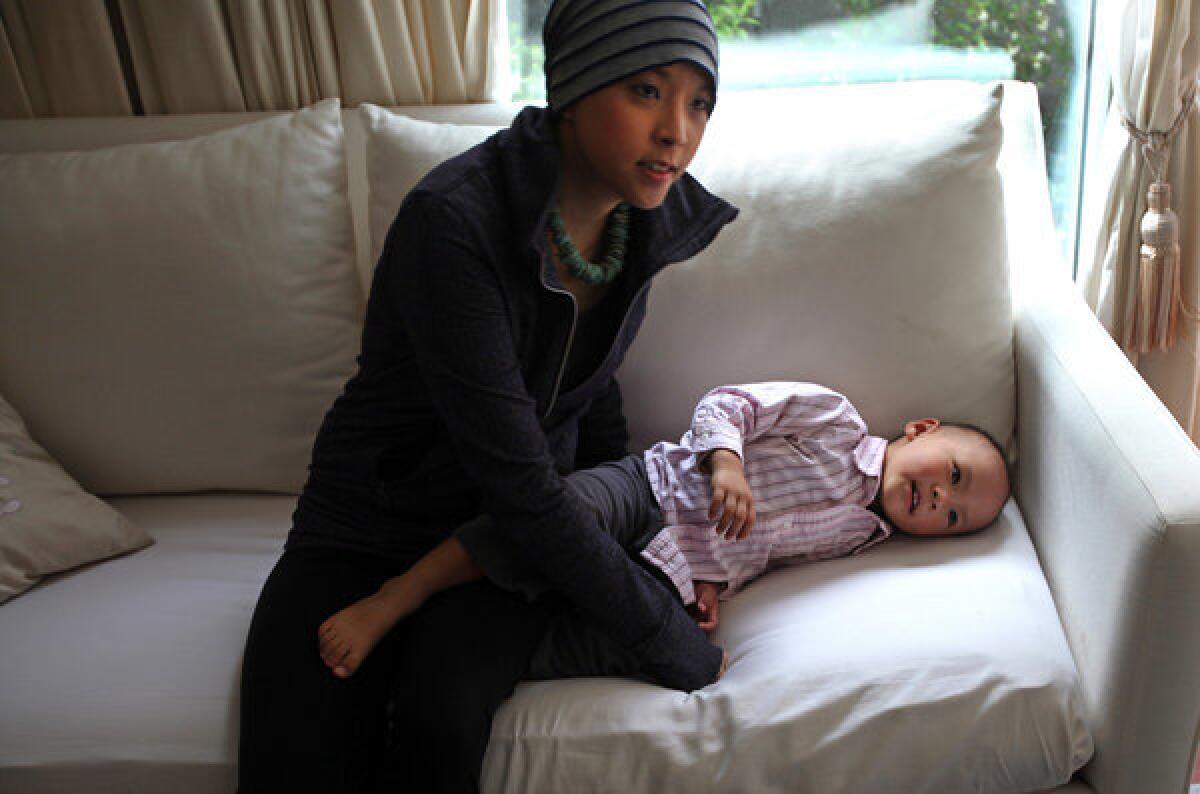
So far, 7,500 people have tested themselves to see if they are potential matches for a blood marrow transplant for Nina. More photos
By January, Nina had gone through seven cycles of chemotherapy, and doctors said her cancer was in remission. She was preparing to go back to work, and she re-enrolled Donny in preschool.
"We were so confident that everything was going to be fine," she said.
But when Nina went in for a routine follow-up scan in March, doctors saw a large, dark spot in her brain. Doctors called Matt, who knelt by Nina's side and held her hand for a few moments before he could break the news to her.
"I couldn't even cry," Nina said.
Surgeons removed a piece of Nina's skull to take a biopsy of the mass, which turned out to be lymphoma. They also found more cancer in her spine.
Doctors began giving Nina more chemotherapy and performing regular spinal taps, a process that can take 30 minutes and be excruciating.
She gets through it by thinking of Donny.
"I think about his 5th birthday, I think about his 10th birthday, I think when he'll get married," Nina said. "I try to remember why I'm doing all of this."

I think about his 5th birthday, I think about his 10th birthday, I think when he'll get married. I try to remember why I'm doing all of this."— Nina Polvanich Louie
Nina's doctors think that her best chance at long-term survival is a bone-marrow transplant within a month. Otherwise, she could try other alternatives, such as injecting some of her own stem cells back into her body, but that could increase her risk of getting cancer again.
Nina has only been able to work up the nerve to ask one young attending physician what her chances for survival are.
"It was terrifying," she said. "Who wants to know the answer to that question?"
The doctor said her chances were over 50%, but Nina wasn't sure how accurate that estimate was.
"But I have to believe that they're putting me through all of this for a reason and there's hope," she said.
Her family and friends have been organizing drives to find donor matches, hoping that thousands of people will swab their mouths to see if they are a match.
So far, about 7,500 have tested themselves. None have been a match.

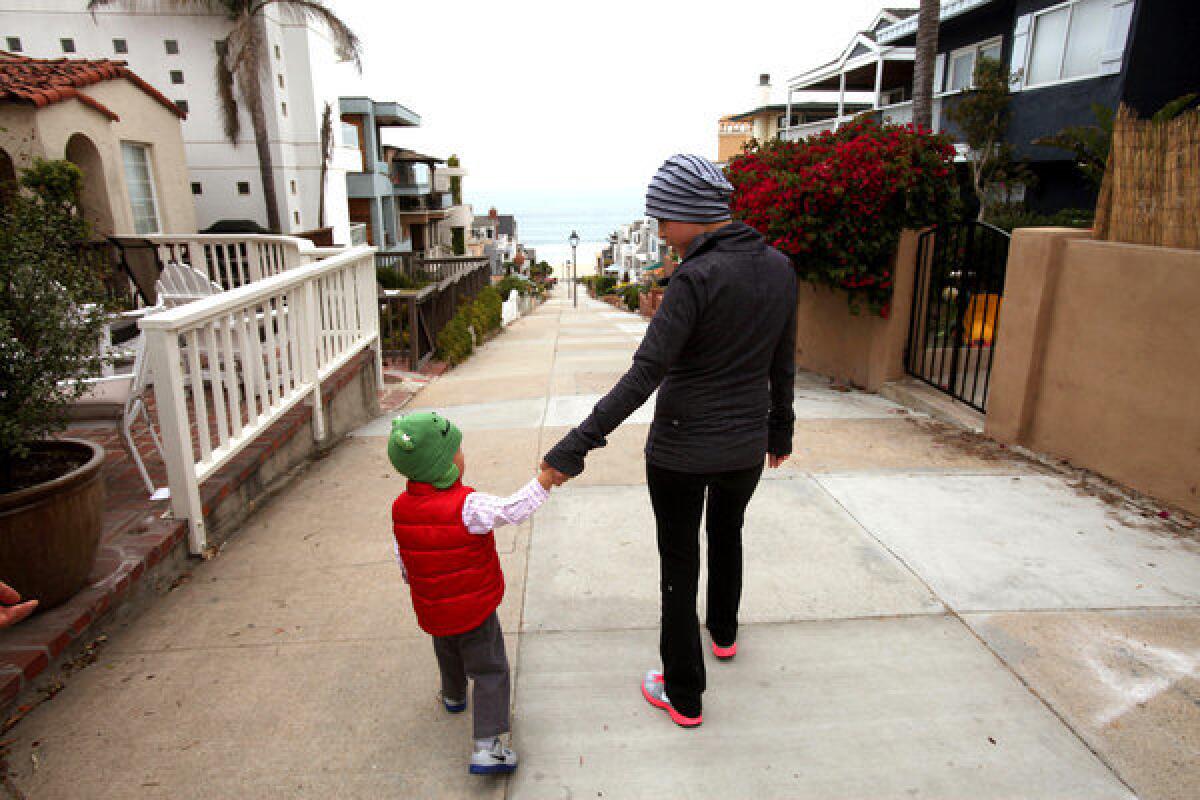
Donny said the word "Mommy" the first time Nina came home from chemotherapy. Every milestone he passes as he grows older is a reminder of how little time she may have left with him. More photos
As her son grows older and becomes more perceptive, it's harder for Nina to hide her illness. He notices when she goes to the hospital, saying: "Donny's sick, too. Donny go to the hospital."
When Nina returned from her skull biopsy, Donny seemed scared of her scar. "Yucky," he declared.
Nina has begun hoarding the time she has with Donny. Now, when he wakes up in the middle of the night, she lets him into bed with her and Matt.
"When you come home from the hospital," she said, "you want to hold your baby and tell him everything's going to be OK."

One day this spring, Nina's father drove her to the hospital for her usual scans. After the procedures, they went to pick up Donny at preschool. Wearing a big grin, he shouted "Mommy, Mommy," showing her the sticker he had received for good behavior.
When they got home, Nina and Donny played with his toys on the living room floor. After half an hour, Donny went to his room and got a blanket. "Sleepy," he said.
Nina took him into the master bedroom with a bottle of milk and his favorite book, "Pete the Cat." She held him in her lap while she read and then lay down with him when she finished.
Nina rubbed her son's back as he drifted off. When she was sure he was asleep, she put her head down next to his and closed her eyes.
To find out more about becoming a bone marrow donor, visit bethematch.org or Nina Louie's website at SaveNina.com.
Follow Jason Song (@latjasonsong) on Twitter
More great reads
Mexicans' names emerge from shadows of 1948 crash
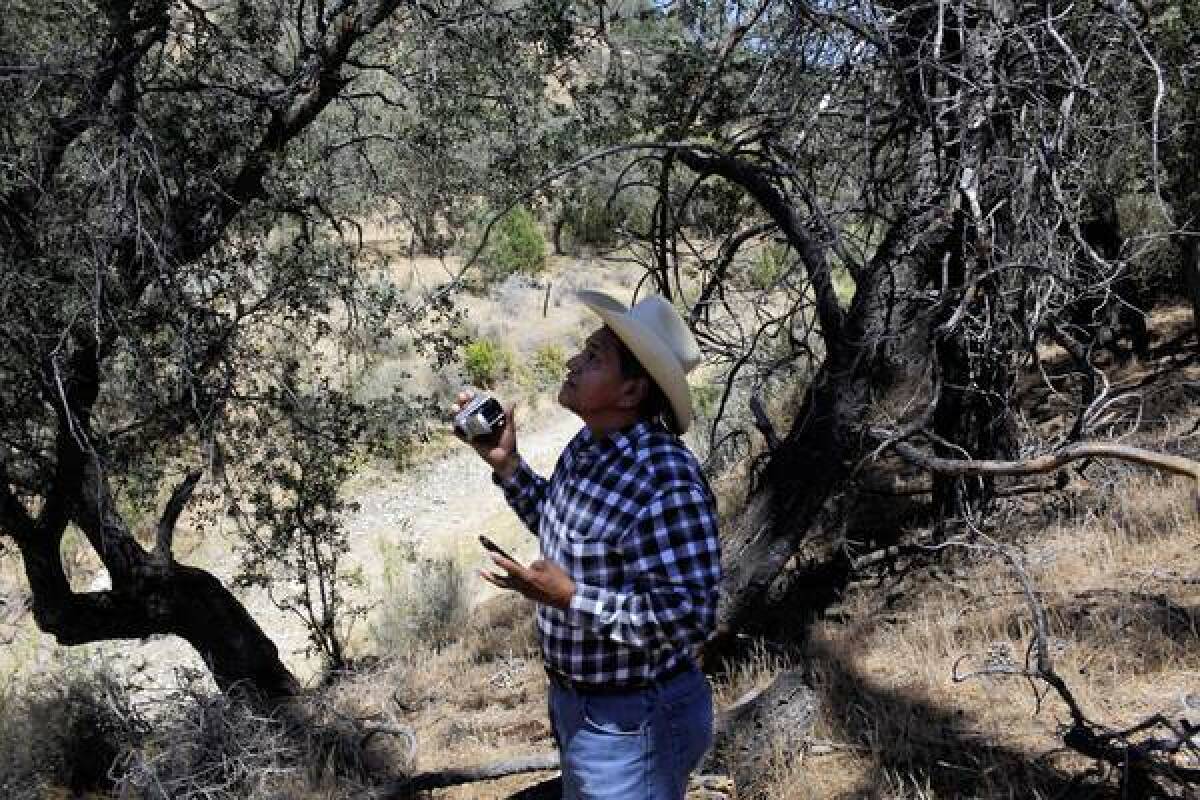
I just stood still, staring at it. I kept telling myself, 'I found them.' "
Sign up for Essential California
The most important California stories and recommendations in your inbox every morning.
You may occasionally receive promotional content from the Los Angeles Times.
